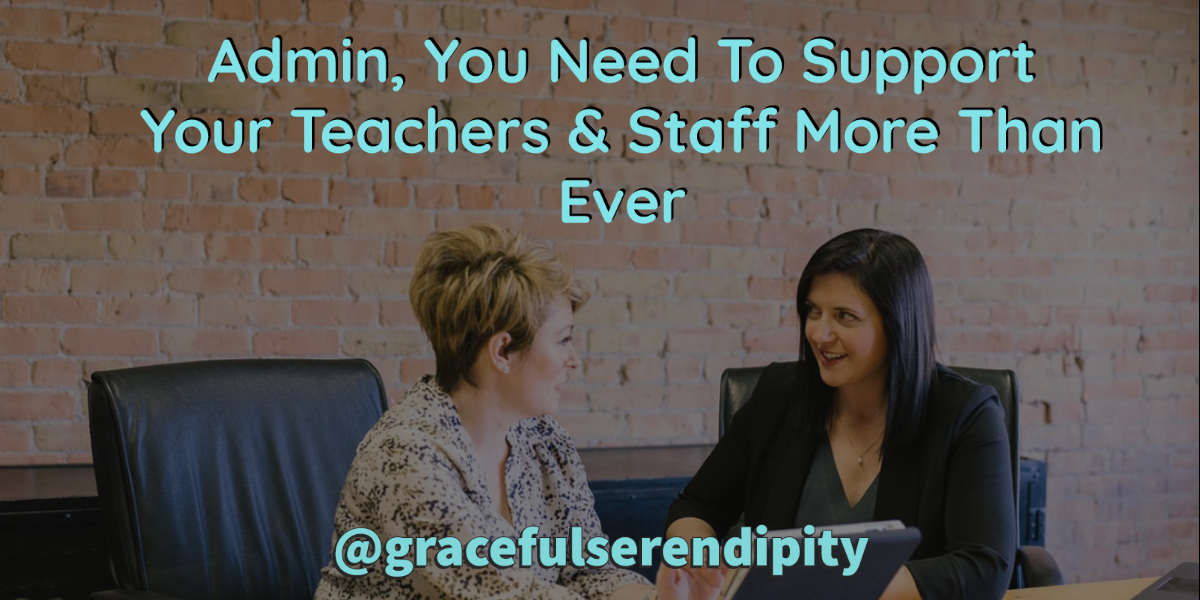Editor’s Note: The views expressed in this commentary are mine alone and do not represent any particular school district. As teachers begin to speak of concerns, I wanted to give them an anonymous platform to have these discussions.
Teachers stress levels surpassed a manageable level long ago. They vent about their misery and lack of respect during this time. Quite frankly, a lot of the unnecessary stress when traced back to its original source lies in the hands of the leadership team. If administrators choose not to support their teachers and staff during this time- there will be consequences. No teacher would make such threats as that reeks of unprofessionalism. However, their future decisions and whispers to other teachers will leaving a lasting legacy. It will impact the quality teachers and staff, school leaders can expect to attract to their school.
What Are District Leaders Doing During This Pandemic?
For district team leaders, their complex job revolves around untangling new directives from the state. Whether these directives come from state agencies like TEA or stakeholders at various schools, they all impact decisions being made. District admin must dance a fine line between following orders and finding a way to execute those orders across their district. Many which have various school population needs. In addition, district admins have the unpleasant job of wrangling information out of state agencies who many times are purposefully vague to the point where one wonders if they met expectations.
Add to that, they must make plans for next year. When exactly should schools reopen in the fall or even later? What happens if there is a resurgence? These discussions and more are being dealt with at the district level. Imagine having to plan for a regular school year and one where Covid19 may still disrupt the summer. These scenarios affects everything from required summer professional development, to a comprehensive curriculum plan that can meet the needs of every student, should a quick transition to online teaching occur yet again.
In addition to their regular job of monitoring and steering their district towards their common vision, many leaders feel as if their wheels are spinning. Extra days? New rules? What next? Thus, the execution of their plans depends heavily on school leadership.
What about School Leadership?
School leadership may find themselves constantly updating and throwing out a myriad of directives to the staff. At times the demands become larger. Teachers must be accountable for students either not attending zoom sessions or not completing paper packets. If a teacher does a video lesson in their classroom or some artful background, that would make pinterest makers jealous everywhere…suddenly the new teacher expectation is for the staff to do the same.
Anytime an idea comes up, the immediate response is, “Let’s discuss this in staff/PLC/department meetings.” They so desperately want to stay ahead of the curve, some lack the foresight to see that their staff is feeling the burn.
Even worse, is the blatantly erroneous charge that teachers are not working or have it easy.
What can Admin Do?
- Realize not all teachers have a home life they can easily share with their students and staff. No, they shouldn’t have to tell you what is wrong in their private lives.
Whether that teacher has a sick child at home, an abusive partner, an elderly parent with dementia, or their home conditions are not ones they want broadcasted, please respect that. Can they show a youtube video instead? Are they allowed to block the video camera on zoom after a quick introduction? What are some of the little things you can do to help ease that private home tension? Allowing teachers to maintain their dignity and keep their private stressors private would be my suggestion.
- Understand some parents have brazenly posted on social media that the school year is effectively over for them-GPA or grades be damned.
Parents may be influenced by changes in grading policy, stress over the amount of work given to students, or beliefs about online learning during this crisis. They could also be handling the crisis poorly and wish to take one stressful thing off their plate. If a parent has given up, rest assure no amount of e-mails, zoom meetings, or Google voice calls, will change their mind. This isn’t the teacher’s fault. And expecting educators to create a miracle, when the parent is more concerned about their next paycheck and the economy, than 2nd grade math or chemistry is absurd.
My advice? Have a solid grading plan and summer school policy in place and share it with parents. Document it. However, know that teachers are trying to engage parents. Right now some of our parents are at their wit’s end and so second grade school work and classes like English III seem to be an inconvenience. While we all value education and want our parents to be supportive, it’s imperative we attempt to see things from their point of view. Many parents are financially desperate. School grades may not even be a priority at this point.
- Teachers and school counselors are not licensed therapists. And for the select few that are, many rules and regulations with telehealth are at stake. Manage expectations and know they are trying their best.
That teacher you love, because she can calm anyone down? The school counselor known for staving off crisis after crisis, all while auditing transcripts? That’s in a normal environment. This isn’t it. They too will have their own private concerns and stressors. Simply, because they keep smiling and refuse to broadcast negativity does not mean more work should be placed on their shoulder. They will always be their to handle a crisis. However, if something is better left with someone on the administrative team, then do so. Let them shine where they are at their best.
- Understand not every teacher or staff member has access to neat editing programs that help create slick videos and photos.
Yes, the graphic created by some random school counselor and teacher in Omaha, Nebraska looks great… They probably have access to software like Adobe Photoshop and spent time learning how to use that particular program. Not only that, many adobe products and other graphic editing software costs a lot of money. Expecting teachers to create free professional graphics and videos, without the adequate software and equipment is simply unfair and unreasonable.
- Not every teacher and staff member is in optimal health. And while your staff members may be healthy, they may have family members at high risk of contracting Covid19. This is the most important thing to remember. If you are lenient with one staff member, but require another staff member to fill out HR paperwork or submit an absence…your staff will talk. And you risk losing their respect.
This one is difficult, because HR rules do not allow admin to necessarily ask everyone about their health status. However, if one staff member is given allowance to stay home and not report to the building, while others in similar situations are, you run the risk of creating tension and strife. If one staff member is able to stay home at your word, but you require another one to fill out HR paperwork, you’ve essentially created a breeding ground for resentment among your staff.
Furthermore, if they make simple requests, such as asking to work in isolation, grant them that request. Having to show up to work, where many places have a stay home order is stressful as it is.
Lastly, make sure someone from the admin team is on campus, on days staff members must show up to the building. Learning no admin needed to be be there damages staff morale and their trust in their leaders.
There is nothing more important right now than the mental and emotional health of your staff. High amounts of stress leads people to make poor decisions. Workers are more likely to leave if they believe that their supervisors do not care about them or show poor leadership. This means both administrators and teachers have to regulate their stress and take proactive measures to mitigate it. As leaders, administrators play a large role in the well-being of the staff. By being aware of the challenges educators face, it allows school leaders to make better informed decisions, while giving the staff the support they need during this crisis.






